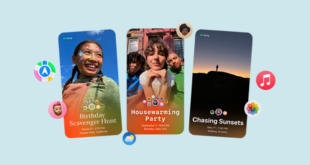
Super Bowl LIX is set to take place this Sunday at the Caesars Superdome in New Orleans and is expected to draw a record-breaking audience of 116.8 million viewers. While this massive event generates excitement, it also attracts cybercriminals looking to exploit unsuspecting fans. Here are four common ways hackers target football fans leading up to the big game.
GET SECURITY ALERTS, EXPERT TIPS – SIGN UP FOR KURT’S NEWSLETTER – THE CYBERGUY REPORT HERE

An American flag on the football field (Kurt “CyberGuy” Knutsson)
Scam tactic #1: Mobile phishing and payment app scams
Cybercriminals will try to exploit the Super Bowl’s reliance on digital ticketing and mobile apps. Fans may receive text messages or social media alerts that appear to be from official payment apps, urging them to “confirm” their information for last-minute ticket upgrades or exclusive merchandise deals. These phishing attempts could lead to fake websites designed to steal banking details.
HOW TO SCORE A GREAT DEAL ON A TV BEFORE THE SUPER BOWL
Scam tactic #2: Pay-to-play scams
Scammers create fake “exclusive raffles” or contests, claiming fans have a chance to win VIP tickets or unique experiences if they pay a small entry fee. These scams often rely on urgency and the fear of missing out. The Better Business Bureau has warned about fraudulent sports betting apps encouraging users to place “guaranteed bets on upcoming games.”

Referee holding official NFL football (Kurt “CyberGuy” Knutsson)
TECH THAT’S SURE TO MAKE YOUR SUPER BOWL PARTY A HUGE SUCCESS
Scam tactic #3: Unauthorized ticket resellers
Scoring last-minute Super Bowl tickets can feel like a victory until you find out they are fake. Sketchy ticket resellers flood search results and social media with deals that seem too good to be true. Online ticket fraud is becoming increasingly common. While some tickets may be legitimate, many are not, with fans spending hundreds or even thousands of dollars for nothing.
Scammers often utilize automation and artificial intelligence to identify and target potential victims based on the language used in their posts. For instance, scammers search for popular buzzwords and hashtags that people use when looking to buy tickets, such as #SuperBowl, #SuperBowlTickets or #LookingForTickets. They then respond to these posts with messages that contain links to other platforms like WhatsApp, Telegram or Cash App, where they attempt to finalize fraudulent deals.

Super Bowl hashtags on social media (Kurt “CyberGuy” Knutsson)
HOW TO GET YOUR TV GAME-READY FOR THE SUPER BOWL
Scam tactic #4: Social media scams
If a social media ad is offering free NFL tickets or merchandise, there is a catch. These scams appear everywhere, promising fans exclusive giveaways if they cover a small shipping fee or provide personal details. The posts look official, sometimes even using fake endorsements from players or teams, making them easy to fall for.
Scammers also use cross-platform operations to evade detection and bans by social media platforms. They will identify and initiate communications with you on one social media platform before requesting you switch to another. This is likely an attempt to prevent one social media platform from gaining full insight into fraudulent activity and banning accounts.
The moment you enter your information or payment details, you have handed cybercriminals access to your bank account. And those free tickets or jerseys never arrive. Scammers rely on the excitement of game day to push people into acting without thinking. The truth is simple. If it sounds too good to be true, it probably is.
Scam tactic #5: Offering massive discounts
Finally, scammers may offer massive discounts for Super Bowl tickets to entice you to buy quickly. They may state they just want to sell the tickets “last minute” to justify large, attractive discounts, such as 50% off or more. They may also claim to have a personal or professional reason for not being able to attend the event, such as a family emergency or a work conflict. Scammers often use these excuses to pressure victims into making hasty decisions and transferring money without verifying the tickets.

Illustration of a hacker at work (Kurt “CyberGuy” Knutsson)
MOST TALKED ABOUT SUPER BOWL ADS
Safeguarding your Super Bowl experience from cyber threats
While scammers will try to prey on Super Bowl fans, you are not completely helpless. Dave Lewis, Global Advisory CISO at 1Password, shared some tips on staying safe leading up to the games. These are not complicated strategies, just simple cybersecurity practices that are easy to follow.
1) Buy tickets from trusted sources: Only purchase from official sites/apps and other reputable channels. Double-check URLs to avoid lookalike sites (which are designed to mimic legitimate event pages). Platforms like Facebook Marketplace, Eventbrite and Nextdoor are also hot spots for scams, so be cautious of sellers “requiring a deposit” through peer-to-peer financial apps like Cash App, Venmo or Zelle.
2) Watch out for event-related phishing attacks: If a deal seems too good to be true, it probably is. Cybercriminals often time their phishing attacks around large events like the Super Bowl, offering fake discount tickets, VIP experiences, free food vouchers, etc. Always verify offers through the event’s official website or app and never agree to anything over the phone. Double-check the sender’s email address and hover over links before clicking to ensure they lead to legitimate event sites.
The best way to safeguard yourself from malicious links that install malware, potentially accessing your private information, is to have antivirus software installed on all your devices. This protection can also alert you to phishing emails and ransomware scams, keeping your personal information and digital assets safe. Get my picks for the best 2025 antivirus protection winners for your Windows, Mac, Android and iOS devices.
3) Keep your phone software and apps updated: Regularly update your device’s operating system (i.e., iOS, macOS, Windows, Android, others). “While constant notifications can be an annoyance at the moment, these updates are essential for keeping your devices secure,” Lewis said. If you’re not sure how to get started, check out this extensive guide on how to update all your devices.
4) Use strong, unique passwords and enable two-factor authentication (2FA): Create complex passwords for all your accounts, especially those related to ticket purchases or event information. Use a password manager to generate and store these securely. Enable 2FA wherever possible, particularly for email and payment accounts. This adds an extra layer of security by requiring a second form of verification, such as a code sent to your phone, in addition to your password. For the Super Bowl, this is especially crucial for any official NFL or ticketing apps you might be using.
5) Be wary of QR codes: While convenient, QR codes can be exploited by hackers for malicious purposes. Only scan QR codes from trusted sources, such as the official event organizer. If unsure, check for signs of tampering, like stickers placed over legitimate codes or poor print quality. When in doubt, don’t scan it. As a precaution, always keep your antivirus software running to prevent malware infections from scanning a scam QR code. If you don’t have antivirus software, check out my top recommendations here.
6) Beware of scammers using social engineering techniques: For example, they may encourage you to transfer money immediately as they allegedly have other prospective buyers. They may also use emotional appeals, such as sympathy, guilt or urgency, to manipulate you into making a decision. Scammers often use these tactics to pressure victims into paying before verifying the tickets.
7) Be wary of individuals showing receipts or proof of purchase: This is not a guarantee that an individual is in possession of a ticket, and it can be easily faked. Scammers can use fake receipts to convince victims that they bought the tickets from legitimate sources, such as Ticketmaster, StubHub or SeatGeek.
8) Exercise caution when interacting with individuals asking for you to “name your price” or are selling below ticket value: This may be a sign that they are trying to lure you into a scam with a too-good-to-be-true offer. Scammers often use this strategy to attract victims who are looking for cheap or affordable tickets.
9) Be cautious when interacting with people claiming to sell tickets on behalf of a friend or family member: This may provide an excuse for scammers using compromised bank accounts with the account holder’s name different from the social media account being used. Scammers often use this pretext to explain the discrepancy between the names on the accounts.
10) Review the account’s recent history: Some scammers may claim to be selling tickets to multiple high-profile events, such as sports games, music concerts and conferences at one time. This may indicate that they are running a large-scale scam operation and are not genuine sellers. Scammers often post multiple ads for different events on the same or different platforms, using the same or similar images and descriptions.
11) Exercise caution and validate ownership: Do this even when purchasing items from friends or friends of friends on social media. A family member or friend’s account can be compromised and used by a scammer. Friends of the victim can vouch for the account user as a legitimate seller, not realizing the account had been hacked.
MASSIVE SECURITY FLAW PUTS MOST POPULAR BROWSERS AT RISK ON MAC
Kurt’s key takeaway
Scammers are always looking for new ways to take advantage of football fans, especially during major events like the Super Bowl. Whether it is fake ticket sales, phishing scams or bogus giveaways, the risks are real. You can easily avoid becoming a victim of these types of attacks by staying vigilant and being cautious of emails and links that ask for personal information.
Do you think the NFL or other major sports leagues are doing enough to protect fans from these scams? Let us know by writing us at Cyberguy.com/Contact.
For more of my tech tips and security alerts, subscribe to my free CyberGuy Report Newsletter by heading to Cyberguy.com/Newsletter.
Ask Kurt a question or let us know what stories you’d like us to cover.
Follow Kurt on his social channels:
Answers to the most asked CyberGuy questions:
New from Kurt:
Copyright 2025 CyberGuy.com. All rights reserved.
 Latest World Breaking News Online News Portal
Latest World Breaking News Online News Portal






